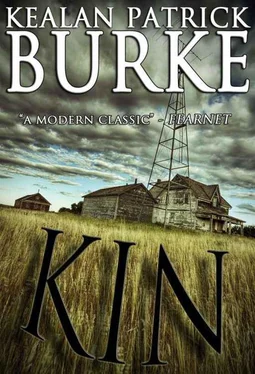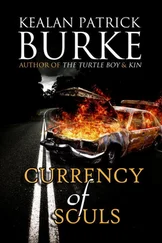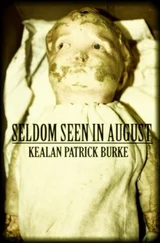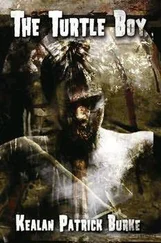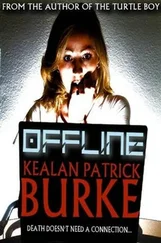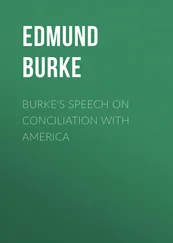Then he spotted Louise Daltry in town, being guided around Jo’s Diner in preparation for her first day’s work. Aside from waylaid vacationers, or guys from the forestry department, strangers were rare in Elkwood, so the arrival of Ms. Daltry, come all the way from Mobile and an abusive husband, was the talk of the place that whole summer. But from the moment Jack set eyes on her caramel-colored skin, high cheekbones, swept-back hair and soft lips, all of which were presided over by a pair of golden-brown eyes that paralyzed him whenever they strayed to his booth, he knew he’d never be concerned with her past. Only her future interested him, and in particular, whether or not she’d ever in a million years consider sharing it with him.
He smiled, just a little, and rubbed a calloused thumb over the rifle’s trigger guard.
“Who’s comin’, Pa?”
We’re moths in a killin’ jar , he thought as he tried to summon a smile of reassurance for the boy that felt more like an expression of pain. Just like your Momma said .
The best day he could remember in his sixty-odd unremarkable years started as the worst. He’d been hungover, his head stuffed with cotton. The sour taste in his mouth had resisted his attempts to wash it away with toothpaste, then coffee, and finally a breakfast of toast, egg, bacon and grits down at Jo’s. Even the presence of Louise, dressed as she was in an immaculate white blouse and blue jeans, looking as beautiful as he’d ever seen her, her skin radiant in the same morning light that skewered his eyes through the slats in the blinds of the diner’s plate glass window, couldn’t raise his spirits. He’d argued with the boy the night before, over what he couldn’t remember, but he remembered striking him, and more than once, so on that day, while the smells of fat and bacon on the griddle turned his stomach and the whiskey hammered his brain, guilt gnawed at his guts.
“Someone went a few rounds with a bottle and lost,” Louise had said, surprising him out of his self-pity and he’d looked up to see her sitting across from him, arms crossed on the table, head cocked slightly, a small smile on her lips.
He’d nodded and given her the usual perfunctory responses, and when he’d forced himself to look at her, he was struck, not only by her beauty, but by the sense that she was peering past his facade, into the dark turbulent sea of his guilt, as if she recognized it because she’d swam in those waters more than once herself.
“Wanna talk about it?” she asked, and though he’d thanked her and shaken his head— I ain’t much of a talker —she hadn’t left, or taken those incredible eyes of hers off him, and at last he began to speak, slowly at first, then with more ease, until that darkness flowed out of him in a torrent he feared might wash her away and out of his life forever.
“The boy ain’t yours?” she asked when he was done.
“He were already in the oven when I met my wife,” he told her. “She never told me who the daddy was, and I guess it didn’t matter. He was long gone when I showed up.”
“Where’s she at now?”
“Dead. She died givin’ birth to ’im.”
“I’m sorry.”
“Yeah, me too.”
That day had broken down some barrier between Jack and Louise he hadn’t realized existed. It had been more than just the protective bubble that surrounds each and every man and woman when in the company of people they have no reason to trust. He got the feeling Louise had seen something in him he hadn’t known was there, something that appealed to her. Though in hindsight, he thought maybe suited her might be a better way of putting it.
“Pa, say somethin’…”
She’d loved him for a time, and they’d been happy, but if he was honest with himself now, he could admit that he knew from the moment she stepped foot into this house, and their lives, that she wasn’t going to stay. It wasn’t because she didn’t love them. She just wasn’t a homebody. After eleven years of living with a man who’d beaten her senseless with whatever object was close at hand whenever she dared sass him, she wasn’t willing to be owned again, or tied down to relationships that were just waiting to go sour. In walking out on that sonofabitch, she’d found her freedom, and though he’d sensed her restlessness right from the start, had known she would never stay, Jack had allowed himself to ignore the reality of it until it smacked him right in the face two years after the day she’d moved in.
We’re moths in a killin’ jar, Jack , she’d said to him when he’d come downstairs to find her with a single suitcase at the open front door, an unfamiliar car with a tall handsome black man at the wheel, engine idling, waiting for her. You leave that lid screwed on tight, we’re gonna die sooner’r later. Best just to set us loose while we still know how to fly. Then, without another word, she’d kissed him and walked out the door, leaving him with an eternity to think of all the things he should have said but didn’t.
Now he turned and looked at the boy who was not his blood, the boy he wanted to love but couldn’t.
Then he looked down at the rifle.
Set us loose while we still know how to fly.
“Somethin’ we gotta do, son,” he said, and slowly rose from his chair.
Deep night came and with it long shadows that crept inexorably toward the Lowell farm.
The Merrill clan was among them.
Aaron had parked the truck at the foot of the hill and killed the engine then joined his father and Luke in walking the long straight path up the rise to where the Lowell farm sat brooding in the dark. The twins stayed in the truck, along with the body parts they had wrapped in plastic, surveying the night for signs that the old farmer and his boy were fleeing, or that there were flickering lights burning the bellies of the clouds on the horizon, foretelling of trouble’s advance on them if it turned out they were too late.
Luke said a silent prayer that they weren’t.
He carefully scanned the wide open areas to their right, where nothing sprouted from the dead earth, and listened to the hissing of the corn in the field to their left. Those sibilant whispers seemed like voices, but he had heard such things enough to tell the difference should a human voice be among them.
Making no attempt to be quiet, Papa-in-Gray, now dressed in a frock-like gray coat—which the kids acknowledged as his preacher garb, for he had told them once he believed himself a messenger, despite his failure to be inducted into a legitimate order—led Luke and Aaron to the door, the fluttering light within assuring them that someone was home, even though the truck Luke had seen earlier was nowhere in sight. Its absence worried him. Where were they if not home? With the Sheriff? The doctor? Luke let his eyes fall to the blade gripped in his father’s right hand, the tip of the ivory handle a pale smudge in the dim light. As a child, he had watched his father sharpening that curved six-inch blade, had marveled at the craftsmanship, but had feared it also, and with good cause. Some years later it would be the instrument they would use on his genitals.
Papa-in-Gray stopped by the door, then turned his head and slowly stepped toward the window.
“He there?” Aaron asked.
Their father leaned his face close to the dusty glass, his shadow sprawling over his sons. His nose brushed the window.
“Papa?” Aaron asked, the nervous excitement in his voice infectious. The air grew taut between them; the temporary reprieve the rain had brought banished now. It was balmy, humid, their clothes stuck to their skin, and with the heat came short tempers.
The old man seemed to stiffen, his shadow flinching as if eager to be free of the tension that held its host in thrall. Luke felt something twist inside him. Something was wrong. Even if instinct had failed him, it was compensated for by the sudden rage radiating from his father’s body. Whatever he had seen in there had not agreed with him.
Читать дальше
